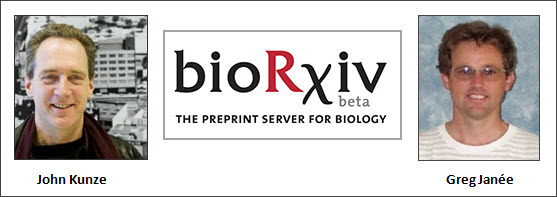EZID Staff in Print: John Kunze and Greg Janée in bioRxiv
John Kunze, Identifier Systems Architect, and Greg Janée, EZID Technical Lead, along with a number of collaborators, published a preprint entitled “Uniform Resolution of Compact Identifiers for Biomedical Data” in bioRxiv, the preprint server for biology. It is available at https://doi.org/10.1101/101279.
Here is the paper’s Abstract: Compact identifiers have been widely used in biomedical informatics both formally and informally. They consist of two parts: 1) a unique prefix or namespace indicating the assigning authority and 2) a locally assigned database identifier sometimes called an accession. The former are useful to avoid global identifier collisions when integrating separately managed datasets run by different communities and consortia, under a variety of autonomous data management systems and practices. This bi-partite identifier approach predates the invention of the Web. In the biomedical domain, the Identifiers.org system supports machine-tractable Web resolution and redirection for names of biomedical digital entities based on a registry of namespaces and a set of resolution and redirection rules. Meanwhile, Name-to-Thing (compactly known as n2t.net) provides resolution of various types of digital entities by managing content directly in its own databases or through prefix-based redirection to the original providers, in a manner akin to Identifers.org. We report here on significant further work by our team toward making compact identifiers available for long-term use in an ecosystem supporting formal citation of primary research data. This approach is intended to be robust beyond the operational and funding scope of any one organization, enabling long-term resolution of cited persistent data in archives. We demonstrate that multiple resolvers with fundamentally different underlying code bases, organizational settings and international alignments, can readily support this approach. As part of this project we have deployed public, production-quality resolvers using a common registry and rules model. This harmonizes the work of n2t.net, based at the California Digital Library (CDL), University of California Office of the President, and identifiers.org, based at the European Molecular Biology Laboratory-European Bioinformatics Institute (EMBL-EBI). Both resolvers, while derived from independently developed code bases, with different features and objectives, can now uniformly resolve compact identifiers according to our rule set, using a set of common procedures and redirection rules. We believe these products and our approach will be of significant help to publishers and others implementing persistent, machine-resolvable citation of research data in compliance with emerging science policy body recommendations and funder requirements.

